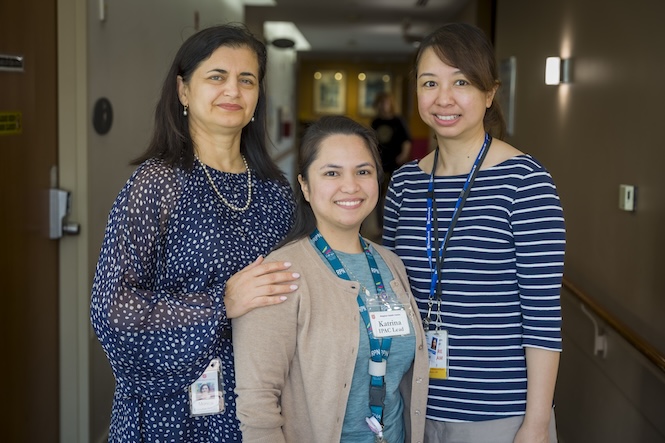Four years after the COVID-19 pandemic devastated long-term care homes, those hit hardest in Ontario are rebuilding with an enhanced focus on infection prevention and control thanks to new Infection and Prevention Control (IPAC) Hubs.
Isobel and Arthur Meighen Manor, owned and operated by the Salvation Army is a 168-bed long-term care home in midtown Toronto. It was one of the hardest hit homes in 2020 when the first wave of the pandemic took the lives of 48 residents, and made more than half its staff ill.
“Our goal is to provide the best quality of care to our residents,” says Monica Klein-Nouri, registered nurse and Executive Director of Meighen Manor, “but at the onset of the pandemic we were completely unprepared.”
At the time, infection control was not embedded into long-term care facilities in Ontario. “The roles fell on nurses, which in reality is only a sliver of their responsibilities and knowledge,” says Klein-Nouri.
Plagued by limited resources and staff shortages, the pandemic exposed critical gaps in the health-care system, leading to a re-evaluation of how we care for our most vulnerable populations and the start of a new relationship between hospitals and long-term care homes in the province.
Improving care through integration
In April 2020, Sunnybrook Health Sciences Centre offered support to Meighan Manor by leveraging its connections through the North Toronto Ontario Health Team and mobilizing a team of infection prevention and control experts to help manage the COVID-19 outbreaks that had taken hold of the long-term care home. The relationship was formalized and expanded in the fall when Ontario Health introduced Infection Prevention and Control (IPAC) Hubs. Local networks of infection prevention and control expertise were established across the health system to enhance infection control practices in community-based congregate living settings, such as long-term care homes.
Sunnybrook was paired with 18 congregate care homes in north Toronto, including Meighan Manor. Known as the North Toronto IPAC Hub, homes were provided with continuous seven-day per week access to hospital infection prevention and control support, including testing, vaccine delivery and clinical support as needed.
The Hub also assessed each homes’ infrastructure, such as heating, ventilation and air conditioning systems, trained staff on IPAC protocols, and created better connections to hospital resources when needed.
“The Hub has become the new normal of how Sunnybrook integrates with its local community partners,” says Dr. Jerome Leis, Medical Director of Infection, Prevention and Control at Sunnybrook and co-lead of the North Toronto IPAC Hub. “We have moved from the initial crisis to a longitudinal partnership where our focus is on prevention.”
Through the implementation of the Hub, homes saw measurable improvements to disease surveillance, detection, management, and interventions that can improve resident outcomes.
Capacity building through knowledge sharing
The North Toronto IPAC Hub remains committed to supporting congregate care homes by continually enhancing infection prevention and control capabilities well beyond COVID-19.
Each home now benefits from bi-weekly visits by a certified IPAC professional who works with the team to address the home’s unique and evolving needs on issues such as infection surveillance, antibiotic-resistant organisms, environmental cleaning protocols, facility renovations, and co-developing protocols for a range of infection-related threats.
Homes are now also provincially mandated to designate an IPAC lead of their own. These leads are working with the Hub to skill-up and become certified practitioners themselves. Webinars and weekly meetings offer training and critical information to help their homes stay on top of emerging threats.
Annual conferences, held in collaboration with Michael Garron Hospital, also equip them with the latest recommendations and implementation challenges that they can share with their peers. “These conferences are helping us navigate new issues that can impact our residents and are equipping us with the skills we need to keep them safe,” says Klein-Nouri.
Continued empowerment with an ethical framework
As IPAC Hubs were being implemented throughout Ontario, a new Fixing Long-Term Care Act mandated that long-term care homes use an ethical framework for policy decisions affecting residents and stakeholders.
“No such framework existed within the IPAC community,” says Heather Candon, Director, Infection Prevention and Control at Sunnybrook and co-lead of the North Toronto IPAC Hub. “We needed a structured approach to decision-making, so we adapted one.”
Developed by the North Toronto IPAC Hub and leading ethicists at Sunnybrook, the Ethical Infection Prevention and Control (EIPAC) Framework provides a step-by-step process to help teams make decisions about infection control measures such as visitation, isolation, masking and understand their impact on residents and their families.
The first-of-its-kind framework has since been adapted to other health-care sectors and is recognized by Infection Prevention and Control Canada and internationally by the Association for Professionals in Infection Control and Epidemiology as a tool that addresses a broader need within the profession.
Looking ahead
By leveraging the strong relationships established through the Hub, homes are better prepared to address infection prevention and control issues beyond COVID-19. “There is still so much work to do within the sector when we consider other emerging threats to the safety of residents,” says Dr. Leis, “and capacity-building is a long-term quality improvement journey.”
Hospitals and community partners working as a team to support the health and well-being of our most vulnerable populations is here to stay.
By Molly Giroux
Molly Giroux is a Communications Specialist at Sunnybrook Health Sciences Centre


